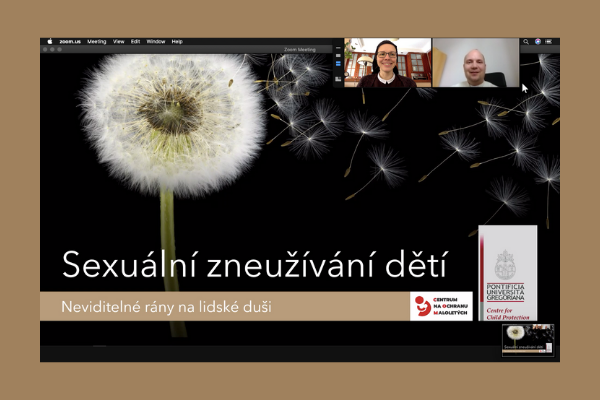
An update from alumni working in Slovakia and Czechia
Today we share an update from Sr. Agnieszka Jarkowska SCdSC, Andrej Kačmár, and Br. Marek Drábek OPraem, all alumni of our diploma course (2017-2018), who are working together in the field of safeguarding in the Slovak Republic and Czech Republic.
In these times of COVID, most of the activities of the Centre for Child Protection (COM Košice) were suspended. Also, a year-long formation course for the prevention of the sexual abuse of minors offered by the Catholic University of Ružomberok, Faculty of Theology of Košice, Slovak Republic, in collaboration with the Centre for Child Protection of the Pontifical Gregorian University (Rome), could not be held entirely online, since it includes face-to-face meetings in addition to online materials. However, we decided to continue preventive work in a different way.
On 3 December 2020, the Department of Roman and Ecclesiastical Law of the Faculty of Law of Trnava University in Trnava, Slovak Republic, organized an online lecture on the topic “Sexual abuse of minors by clerics – historical, canonical, and criminal context”. The speaker was JCLic. Andrej Kačmár, director of the COM Košice. More than 50 students participated in the event.
Afterwards we conducted a few webinars on the protection of minors and vulnerable adults from sexual abuse (CSA) in educational settings. One was run for the Salesian Sisters and Brothers. Dr. Slávka Karkošková, a member of COM Košice, presented terms and definitions (sexual abuse, informed consent, consequences of abuse, etc.), the limits of CSA criminal solutions, and the counterintuitive responses of CSA victims. Andrej Kačmár spoke on the topic of canonical processes in the Church in response to CSA.
Another training workshop for teachers and other employees of the Catholic High School in Žilina, Slovakia, was led by Sr. Agnieszka and Br. Marek on 17 February 2021. The school is run by the Congregation of School Sisters of St. Francis. The sisters are preparing guidelines and a protection policy. The workshop for teachers was part of their introduction to the topic of safeguarding. Participants were taught terms and definitions related to CSA, basic information about victims and their counterintuitive responses and about perpetrators. The next workshop will include topics such as disclosure, prevention in institutions, and how to deal with cases.
During webinars, Br. Marek sometimes shares informative videos, talks, and testimonies by victims, which are available on his YouTube channel. This channel is also part of his preventive work to help not only victims but mainly bystanders in better understanding the delicate nature of CSA. He started sharing videos and testimonies about two years ago, and during the pandemic he started creating his own videos.
We are happy for this possibility to share our experiences and we hope to continue our commitment to the protection of minors. The team of COM Košice is preparing further lectures and plans for the next academic year with the hope of returning to educational programs in which participants are physically present.

